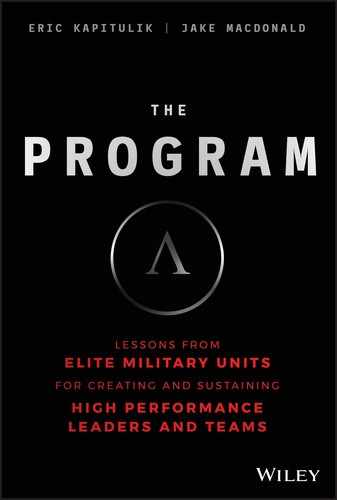13
Meet the Standards: Be a Thumb Teammate!
JAM YOUR THUMB INTO your chest repeatedly. That is being a thumb teammate. Point your index finger at a teammate. That is being a finger teammate. Great teammates consistently meet the organization’s standards, and then hold their teammates accountable to achieving them. Accountability makes us the best versions of ourselves. Our competition, and the battlefields where we compete, will demand our very best. Unfortunately, if we wait until those moments to give it, we are doomed to mission failure. Great teammates understand this. Great teammates hold teammates accountable, but to do so successfully, we must first be “a thumb teammate.” As discussed in Chapter 2, one of the first lessons all Marine Corps officers are taught is “Never ask a Marine to do something that you aren’t willing to do yourself.” Otherwise, Marines will never trust or respect you, both vital characteristics of teammates in any world-class organization, and often two of the Core Values of high-performing teams. Too often though, teammates cut corners on Monday, but then try to hold other teammates accountable for the same issue on Tuesday. We have no right to be “a finger teammate” if we have not already been “a thumb teammate” first. An unwillingness to do so causes individual relationships and teams to fracture and fail. Standards reinforce behaviors and how we behave requires us to make a choice. It does not require talent. Therefore, if we choose not to be “a thumb teammate,” it is due to an unwillingness, not an inability. On the night of May 24, 2004, Det 1’s mission, named Operation Ricochet, was to capture a known improvised explosive device (IED) maker. They planned on hitting his house late at night, using an explosive breach (bomb) to blow the door off the hinges and then pull him out of bed before he, or any of his associates, had time to react. They had trained and successfully executed similar missions multiple times without major incident. This night would be different. The Assault Force had been broken down into six smaller six- or seven-man teams. On previous missions, Teams 1 and 3 had proven themselves and been very successful as the “main effort,” the teams placing the breach and removing the bad guy from the crisis site. During Operation Ricochet, Det 1 leaders had decided to switch the teams. A breacher is the individual in the assaulting force responsible for making the explosive charge that will be placed on a door or wall on the objective site. He is then responsible for exploding that charge. The explosion would blow the door off the hinges and into the room. The assaulters would immediately “ride” the breach into the crisis site. They would use the resulting noise, smoke, confusion, and chaos of the explosion to capture or kill any enemies before they had time to react. All members of Det 1 were extremely talented at their chosen profession. They didn’t just have Marines with sniper qualifications; they had the best snipers in the Marine Corps. The same was true for their radiomen, explosive experts (breachers), corpsmen, and every other role in Det 1, including their support personnel. Every member was extremely talented, but also tough, selfless, competitive, and disciplined. Det 1 had chosen to use a certain type of explosive breach while conducting these operations due to the chaos and confusion it caused the enemy. If done properly, the enemy would have no time to respond before the assault force was in the objective area and gaining fire superiority. Almost instantaneous with the breach exploding, Det 1 Marines would be “on top of” the bad guys. All the breachers were trained to the same standard. There were standards for the type of explosive charge to be used and how it was to be placed on the door. Understanding that the enemy, the battlefield, and other factors might make them deviate from the standard, there was a standard that any changes be communicated to everyone on the team. There was also a standard that the more experienced breachers check the new, less experienced breachers’ explosive charges. There were numerous other standards as well. Unfortunately, it was these that would come back to haunt the assault force in the early morning hours of May 24, 2004. In the short term, enough talent can compensate for standards not being met on any battlefield. Talent can “win games.” However, choosing not to meet standards will eventually catch up to anyone and every team, regardless of talent level. In contrast, talent combined with our choosing to consistently meet the standards, to be a thumb teammate first, allows us to consistently accomplish the mission regardless of our chosen battlefield. Make a commitment to be a thumb teammate first. If we behave at a world-class level consistently, we will perform at a world class level just as consistently. It doesn’t guarantee mission accomplishment or winning a championship, but first meeting the standard, and then ensuring everyone else does as well, ensures that we will have the opportunity to compete for them. A “thumb teammate” is synonymous with the first standard of being a great teammate (meet the standards of your team) and is vital to successfully accomplishing the second (holding our teammates accountable to meeting them).
